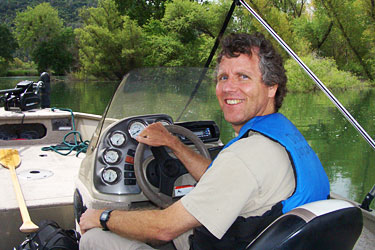Learn More About PUC
Hayes Leads Conservation Research Project
By Katelynn Christensen on August 11, 2010
Share this

Hayes on the water conducting research at Clear Lake.
It is an exciting time for Floyd Hayes, professor of biology, as he takes a leading role in a new project to protect nesting grebes, some of northern California’s most elegant fresh water birds.
“I'm really excited about the project because I'll be able to spend a lot of time out on Clear Lake getting intimately familiar with these elegant birds,” says Hayes. “[They] have some of the most spectacular courtship displays in the avian world.”
Hayes will be responsible for managing $50,800 from a grant from the National Wildlife Federation to monitor and conduct conservation efforts toward breeding grebes at Clear Lake—California’s largest freshwater lake, about two hours’ drive from PUC. He and his collaborators will conduct weekly surveys during the nesting season to locate grebes and measure their reproductive success.
A few selected PUC students who are aspiring field biologists will have the unique opportunity to assist Hayes in his research. The team will also post buoys and barriers to break up waves in the vicinity of colonies and reach out to local stakeholders through presentations and distribution of printed materials, which will inform locals of the hazardous impact of boat wakes and recreational fishing on grebes’ floating nests.
Nesting grebe populations vary dramatically from year to year—from a high of 2,675 birds in year 2,000 to a low of 20 in year 2007. The causes of this fluctuation are not well understood, but are likely related to changes in the availability of grebes’ food supply, which consists of small fish, especially threadfin shad and silversides. These fish appear to be highly sensitive to changes in temperature and water and oxygen levels.
Latest News
Winter Student Week of Worship: Destined to Experience God
By Marina Maher on February 20, 2026
16 Schools Compete in Pioneers Invitational Academy Basketball Tournament
By Ally Romanes on February 5, 2026
Jordan Delarmente: Christ-Centered Service in the Military
By Marina Maher on January 29, 2026
Charlie: The Aviation Program’s New Vessel for Service and Mission
By Marina Maher on January 26, 2026
